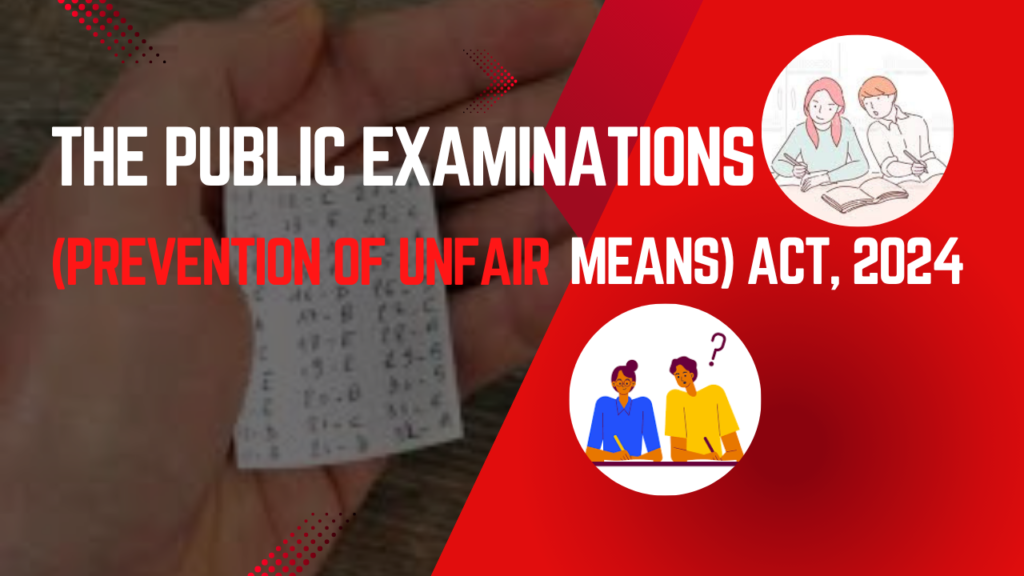Cheating in exams is not just unfair — it’s unlawful. In a land of justice, shortcuts to success lead straight to consequences.
Introduction
Public Examinations Prevention of Unfair Means Act 2024 is a need in India as it conducts one of the largest sets of public examinations in the world, ranging from school board exams to high-stakes competitive exams like UPSC, SSC, NEET, JEE, and various recruitment tests for public sector jobs. Over the years, these exams have repeatedly been marred by instances of question paper leaks, impersonation, cheating mafias, and widespread use of unfair means. These acts not only jeopardize the careers of lakhs of genuine aspirants but also erode public trust in the examination system.
To tackle this issue comprehensively, the Government of India passed the Public Examinations (Prevention of Unfair Means) Act, 2024, which came into force in February 2024. This landmark legislation marks a significant step toward safeguarding the sanctity of public examinations and ensuring merit-based selection.
Background and Context
India has witnessed several major paper leak scandals in recent years, including:
- Bihar School Examination Board Toppers Scam (2016)
- UP Police Constable Exam Paper Leak
- Haryana CET & HTET Paper Leak
- NEET UG 2023 paper leak allegations
- SSC 2017 paper leak protests
These incidents triggered widespread protests, student unrest, exam cancellations, legal battles, and administrative chaos. Moreover, organized crime syndicates were found to be exploiting systemic loopholes in the conduct of exams.
The urgent need for a dedicated legal framework led to the formulation of the Public Examinations (Prevention of Unfair Means) Bill, 2024, which was passed by both houses of Parliament and received Presidential assent, becoming an Act in February 2024.

Objective of the Act
The primary objective of the Act is to:
- Deter and penalise organised malpractices in public examinations.
- Ensure transparency, fairness, and integrity in competitive examinations.
- Create a legal deterrent against paper leaks, impersonation, and cheating syndicates.
- Protect the rights and interests of honest and deserving candidates.
Key Definitions
The Act provides clear definitions of terms to ensure legal precision:
- Public Examination: Includes any test or examination conducted by:
- Union Public Service Commission (UPSC)
- Staff Selection Commission (SSC)
- Railway Recruitment Board (RRB)
- National Testing Agency (NTA)
- Institute of Banking Personnel Selection (IBPS)
- National Recruitment Agency (NRA)
- Any authority notified by the central government.
- Unfair Means: Refers to acts such as:
- Leakage of question papers
- Impersonation of candidates
- Tampering with computer networks
- Creation of fake documents or answer sheets
- Helping candidates through electronic devices
- Organised cheating operations
Salient Features of the Act
1. Applicability
The law applies to public examinations conducted by the central government agencies. It does not apply to state-level exams unless notified by the central government.
2. Stringent Punishments
The Act introduces harsh penalties to deter wrongdoers:
| Offense | Punishment |
|---|---|
| Leakage of paper or answer key | Minimum 3 years imprisonment (extendable to 5 years) and fine up to ₹10 lakh |
| Impersonation or cheating using tech | 3 to 5 years imprisonment |
| Organised crime by group/institution | 5 to 10 years imprisonment and minimum fine of ₹1 crore |
| Damage to exam infrastructure (servers, network) | 3 to 10 years imprisonment |
3. Attachment of Property
If an institution or organisation is found guilty, its property and assets may be attached and confiscated, especially when found to be derived from proceeds of the crime.
4. Corporate Liability
If the offence is committed by a company, its directors, managers, and other responsible persons will be held liable, unless they prove lack of knowledge or due diligence.
5. Cognizable and Non-Bailable Offences
All offences under this Act are cognizable, non-bailable, and non-compoundable, giving police wide powers to arrest without warrant and deny bail easily.
Why Was This Law Necessary?
1. Rising Incidents of Leaks and Frauds
According to data, there were over 50 major paper leak cases between 2018 and 2023, affecting over 1.5 crore students across India. Earlier laws were scattered across the IPC, IT Act, and state laws, which lacked a comprehensive and centralised framework.
2. Organised CrimeInvolvement
Several paper leak incidents were found to be orchestrated by organised gangs using advanced technologies like Bluetooth-enabled devices, fake biometric attendance, and hackers. The new law specifically targets these organised cheating rackets.
3. Students’ Trust in Institutions
Repeated examination irregularities lead to mental trauma, uncertainty, and a lack of trust among students. This law seeks to restore credibility and faith in public exams by making the system more robust and secure.
Criticism and Concerns
While the Act has been welcomed widely, there are some criticisms and challenges:
1. Exclusion of State Exams
Many large-scale state-level exams, like those by State Public Service Commissions and State Board Exam,s are not covered unless the Centre explicitly notifies them. Critics argue that this limits the law’s scope.
2. Fear of Harassment
There are concerns that students or small-time employees may be falsely implicated or harassed under the stringent provisions of the law. Ensuring just and fair implementation is key.
3. Lack of Systemic Reform
Some experts believe legal deterrence alone is not enough. The examination process itself must be reformed,including stronger cybersecurity, encrypted paper transfers, biometric verification, and better invigilation.
Government’s Response
Union Education Minister Dharmendra Pradhan, while introducing the Bill in Parliament, called it a “historic moment” and said:
“This law is not aimed at students. It is aimed at organized gangs and corrupt officials who play with the future of our youth. This is a decisive step to protect the sanctity of examinations.”
The government has also promised to:
- Use AI-based monitoring to prevent leaks.
- Strengthen NTA’s internal security and processes.
- Encourage CBI-level investigation in major leak cases.
Real-Life Impact: Early Cases
Soon after the law was passed, enforcement began:
- In May 2024, during the conduct of a national railway exam, 6 people were arrested under the new Act for using electronic devices to transmit answers.
- The NEET UG 2024 was held with heightened security under this new legal regime, including biometric re-verification and AI proctoring.
Conclusion
The Public Examinations (Prevention of Unfair Means) Act, 2024 is a crucial and much-needed piece of legislation to address the menace of exam malpractices in India. While the Act is a strong deterrent against unfair means, its success will ultimately depend on:
- Efficient implementation
- Systemic reforms
- Safeguards against misuse
- Coordination between central and state agencies
For India to ensure a level playing field for all aspirants, uphold meritocracy, and build a future workforce based on talent and hard work, such laws must be supported by technological innovations and strict administrative vigilance.
Key Takeaways for CLAT & Current Affairs:
- Passed in 2024, applicable to central-level public exams.
- Imposes strict jail terms and fines for paper leaks, impersonation, and cheating.
- Defines offenses clearly and targets organized crime in exams.
- All offences
- Crucial for legal GK, legislation-based questions, and current affairs essays.
- are cognizable and non-bailable.


